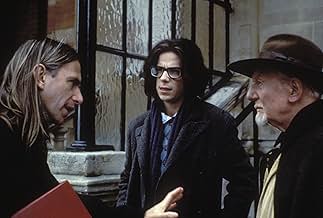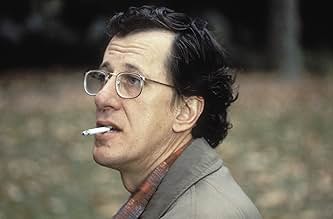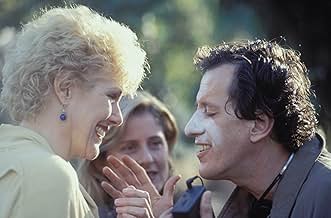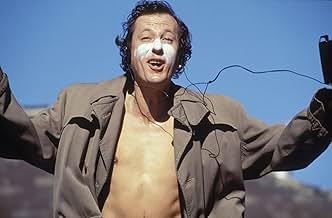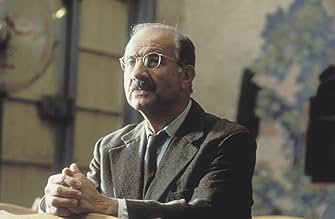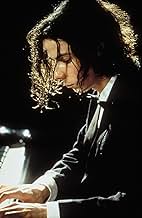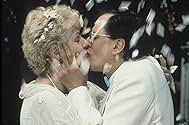IMDb-BEWERTUNG
7,6/10
57.469
IHRE BEWERTUNG
Von seinem Vater und seinen Lehrern unter Druck gesetzt, erleidet der Pianist David Helfgott einen Zusammenbruch. Jahre später kehrt er ans Klavier zurück und erlangt zwar nicht die Anerkenn... Alles lesenVon seinem Vater und seinen Lehrern unter Druck gesetzt, erleidet der Pianist David Helfgott einen Zusammenbruch. Jahre später kehrt er ans Klavier zurück und erlangt zwar nicht die Anerkennung der Kritiker, aber die des Publikums.Von seinem Vater und seinen Lehrern unter Druck gesetzt, erleidet der Pianist David Helfgott einen Zusammenbruch. Jahre später kehrt er ans Klavier zurück und erlangt zwar nicht die Anerkennung der Kritiker, aber die des Publikums.
- 1 Oscar gewonnen
- 46 Gewinne & 52 Nominierungen insgesamt
Handlung
WUSSTEST DU SCHON:
- WissenswertesGeoffrey Rush had once learned the piano up until aged fourteen. He took up piano lessons again thirty years later for this movie and also acted as his own hand double and body double.
- PatzerThe character shows all signs of schizophrenia; not bipolar disorder (formerly known as "manic-depressive disorder"), as is claimed in the film. The real David Helfgott likewise displays many symptoms of schizophrenia and none of bipolar disorder.
- Zitate
Cecil Parkes: You must play as if there's no tomorrow.
- Crazy CreditsHimself: hand double for Geoffrey Rush
- SoundtracksWith A Girl Like You
Written by Reg Presley
© 1966 Dick James Music Limited
Performed by The Troggs
© 1966 Mercury Ltd. London
Ausgewählte Rezension
"Shine" purports to tell the story of David Helfgott (Geoffrey Rush, who plays the adult Helfgott), a promising pianist who overcame mental illness, with the help of his wife, and returned to performing.
The 1996 film is actually a fictionalized version of Helfgott's life - but even had it not been based on a true story, it remains a powerful, intriguing film.
David is the child of German émigrés who now live in Australia. His father Peter (Armin Mueller-Stahl) is a self-taught pianist who teaches David his same love of piano and classical music. There is love there, but as portrayed in the movie, Peter is a rigid man who gives his son mixed signals. He drives his son to succeed as a pianist, teaching him that winning is everything, and yet, when David has opportunities that would take him away from the family, Peter won't permit it. The reason for this is that Peter and his wife lost relatives in the Holocaust. Peter is also given to physical abuse toward David when he loses his temper.
David finally gets away from him and attends the Royal Conservatory in London, where, with the help of his teacher (John Gielgud), he wins an important competition but then suffers a severe nervous breakdown. The rest of the movie deals with the road back, which leads him home to Australia and to his wife, Gillian. Gillian is actually his second wife, though the first marriage isn't mentioned in the film.
The dominant performances belong to Rush and Mueller-Stahl. Rush does a brilliant job of showing us the likable but stuttering David who speaks rapidly and repetitively, expressing himself through music. Mueller-Stahl as the tortured Peter is fabulous, a man who is both monstrous and pitiable. In a small role, John Gielgud of course makes a fine impression as an elderly teacher, a wonderful pianist himself, who believes in David's talent.
The best scene is David playing Rachmaninoff's Piano Concerto #3 - Helfgott's own recording of the piece is used - and the aftermath. What I missed in this film is music - there was a lot of talk about David's promise, but until the Rachmaninoff not much playing.
Helfgott's work today has been deeply criticized for being - well, lousy. A review in The New York Times of one of his concerts is horrible. The reviewer, however, mentions that Helfgott occasionally showed vestiges of excellent technique. I think it's safe to assume that his playing nowadays is more erratic than it was in his earlier years. There are several examples of Helfgott's playing in the movie: "La Campanella," "Hungarian Rhapsody No 2 In C Sharp Minor," "Flight of the Bumble Bee," Rachmaninoff's "Prelude In C Sharp Minor, Opus 3, No. 2," the previously mentioned Rachmaninoff 3, and Liszt's "Sospiro," and it is all quite stunning. Rush does the fingerings himself. One of the comments also claims that Helfgott's wife has Helfgott perform on no medication so that he'll seem crazy - it's common for performers on medication for mental problems to have to cycle off of it before performing. I don't think the commenter has any idea what Helfgot is like on his medication - certainly in the film, he acts strangely.
"Shine" is highly recommended for its fantastic performances, beautiful music, and its inspiring story.
The 1996 film is actually a fictionalized version of Helfgott's life - but even had it not been based on a true story, it remains a powerful, intriguing film.
David is the child of German émigrés who now live in Australia. His father Peter (Armin Mueller-Stahl) is a self-taught pianist who teaches David his same love of piano and classical music. There is love there, but as portrayed in the movie, Peter is a rigid man who gives his son mixed signals. He drives his son to succeed as a pianist, teaching him that winning is everything, and yet, when David has opportunities that would take him away from the family, Peter won't permit it. The reason for this is that Peter and his wife lost relatives in the Holocaust. Peter is also given to physical abuse toward David when he loses his temper.
David finally gets away from him and attends the Royal Conservatory in London, where, with the help of his teacher (John Gielgud), he wins an important competition but then suffers a severe nervous breakdown. The rest of the movie deals with the road back, which leads him home to Australia and to his wife, Gillian. Gillian is actually his second wife, though the first marriage isn't mentioned in the film.
The dominant performances belong to Rush and Mueller-Stahl. Rush does a brilliant job of showing us the likable but stuttering David who speaks rapidly and repetitively, expressing himself through music. Mueller-Stahl as the tortured Peter is fabulous, a man who is both monstrous and pitiable. In a small role, John Gielgud of course makes a fine impression as an elderly teacher, a wonderful pianist himself, who believes in David's talent.
The best scene is David playing Rachmaninoff's Piano Concerto #3 - Helfgott's own recording of the piece is used - and the aftermath. What I missed in this film is music - there was a lot of talk about David's promise, but until the Rachmaninoff not much playing.
Helfgott's work today has been deeply criticized for being - well, lousy. A review in The New York Times of one of his concerts is horrible. The reviewer, however, mentions that Helfgott occasionally showed vestiges of excellent technique. I think it's safe to assume that his playing nowadays is more erratic than it was in his earlier years. There are several examples of Helfgott's playing in the movie: "La Campanella," "Hungarian Rhapsody No 2 In C Sharp Minor," "Flight of the Bumble Bee," Rachmaninoff's "Prelude In C Sharp Minor, Opus 3, No. 2," the previously mentioned Rachmaninoff 3, and Liszt's "Sospiro," and it is all quite stunning. Rush does the fingerings himself. One of the comments also claims that Helfgott's wife has Helfgott perform on no medication so that he'll seem crazy - it's common for performers on medication for mental problems to have to cycle off of it before performing. I don't think the commenter has any idea what Helfgot is like on his medication - certainly in the film, he acts strangely.
"Shine" is highly recommended for its fantastic performances, beautiful music, and its inspiring story.
Top-Auswahl
Melde dich zum Bewerten an und greife auf die Watchlist für personalisierte Empfehlungen zu.
Details
- Erscheinungsdatum
- Herkunftsland
- Offizielle Standorte
- Sprachen
- Auch bekannt als
- Shine
- Drehorte
- Produktionsfirmen
- Weitere beteiligte Unternehmen bei IMDbPro anzeigen
Box Office
- Budget
- 5.500.000 $ (geschätzt)
- Bruttoertrag in den USA und Kanada
- 35.892.330 $
- Eröffnungswochenende in den USA und in Kanada
- 162.179 $
- 24. Nov. 1996
- Weltweiter Bruttoertrag
- 35.999.121 $
- Laufzeit1 Stunde 45 Minuten
- Farbe
- Sound-Mix
- Seitenverhältnis
- 1.85 : 1
Zu dieser Seite beitragen
Bearbeitung vorschlagen oder fehlenden Inhalt hinzufügen

Oberste Lücke
By what name was Shine - Der Weg ins Licht (1996) officially released in India in Hindi?
Antwort



